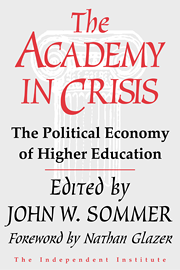The First Step Act signed into law by President Trump on Dec. 21, 2018, left out a very important component of criminal justice reform. The act authorized $250 million over five years for the development and expansion of skill-building and vocational education classes to help prisoners become better prepared to enter the workforce after release. However, First Step contains nothing to help current and former inmates access the U.S. Department of Education’s student loan and Pell Grant programs to help them obtain college degrees. This sends a mixed message about higher education’s part in rehabilitative justice, and it increases long-term costs to taxpayers.
The current Higher Education Act and U.S. Department of Education regulations prohibit prisoners from accessing key federal student aid programs. Eliminating Pell Grant eligibility was part of a broad federal crackdown on crime in 1994. In 2015, the Obama administration took a first step toward reversing this ban by creating a Second Chance pilot program offering limited access to Pell Grants through 64 participating colleges.
In a conference held at the Vera Institute on July 15, Education Secretary Betsy DeVos told Second Chance program representatives that she supports the program and hopes Congress will amend current legislation to restore Pell Grant eligibility to the incarcerated. “It’s Congress’s chance to act and do its job to make sure to extend this opportunity in a very sustainable and predictable way to many people across our country,” asserted DeVos. Sen. Lamar Alexander (R-Tenn.), chair of the Senate Education Committee, has indicated support for repealing the 1994 ban in the pending reauthorization of the Higher Education Act.
The National District Attorneys Association last week issued a statement backing the REAL Act, introduced in April by Sen. Brian Schatz (D-Hawaii), which would reverse the ban on Pell Grants for incarcerated students. Schatz’s bill was co-sponsored by Sens. Mike Lee (R-Utah) and Dick Durbin (D-Ill.).
The bipartisan consensus on many aspects of criminal justice reform has emboldened many advocates to press for changes in student aid law sooner, rather than later. Hayne Yoon, the director of government affairs at the Vera Institute, notes that the “synergy between the right and the left” has “really moved the issue forward on Capitol Hill.” Already this year, bills in both the House and Senate to repeal the Pell Grant ban have obtained both Republican and Democratic supporters.
In a related matter, the progressive Leadership Conference Education Fund has recommended dropping a question from the Free Application for Federal Student Aid (FAFSA) about an applicant’s prior drug offense convictions. The Leadership Conference argues that the question has a disproportionate impact on minority applicants. More broadly, the Leadership Conference advocates that all questions about criminal background should be eliminated from the FAFSA and college admissions applications because “denying students access to education does not make sense in the context of the rehabilitative responsibility of the justice system.”
This proposal, which likely will garner support from most Democrats, should make sense to Republicans, for two reasons. First, the Leadership Conference argument about the rehabilitative responsibility of the justice system is morally right. Ex-offenders should not continue to pay the price for their crimes after they have served their sentences. A badge of shame for life is not a good token to award those whom we would want to welcome back to civil society.
Additionally, there is strong empirical evidence that helping current and former prisoners earn college degrees can dramatically increase their lifetime earnings. Georgetown University in 2016 calculated a $1 million lifetime gap in income between high school and college graduates. The Pew Research Center has documented a $17,500 yearly gap in income. The College Board in 2017 reported similar leaps in income for college graduates, as well as lower unemployment rates.
Clearly, these dramatic figures show a strong benefit to taxpayers in treating current and former inmates the same as non-incarcerated citizens, both in future taxes paid and a more powerful long-term impact on the country’s economic health. The value of higher education to combat recidivism is intuitively part of the equation—but even if that were not the case, the economic cost-benefit analysis alone should make the case for change, now rather than later.









